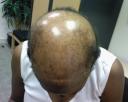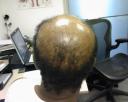20.07.2007
in Uncategorized
Main Use Active Ingredient Manufacturer
Male pattern hair loss Finasteride (1mg). Merck Sharp & Dohme
How does it work?
Propecia tablets contain the active ingredient finasteride, which is a type of medicine called a type II 5-alpha reductase inhibitor.
Finasteride works by inhibiting the action of a compound in the body called type II 5-alpha reductase. This compound is called an enzyme, and is responsible for converting the male hormone testosterone into dihydrotestosterone (DHT). DHT is a hormone that can damage hair follicles and lead to hair loss in men who are genetically sensitive to it.
As finasteride prevents the action of type II 5-alpha reductase it prevents the formation of DHT. This decreases the amount of DHT both in the blood and the scalp and can lead to reversal of the balding process.
The medicine is taken by mouth to increase hair growth and prevent further hair loss in men with male pattern baldness. It may take three to six months of treatment before you notice a decrease in hair loss or increase in hair density. Continued use of this medicine is recommended to obtain the maximum benefit. If you stop taking it you are likely to lose any hair you have gained within 9 to 12 months.
What is it used for?
Male pattern hair loss (androgenetic alopecia)
Warning!
Propecia tablets are not prescribed on the NHS.
Women who are pregnant or of childbearing age should not handle broken or crushed tablets of this medicine, as the medicine may be absorbed through the skin and be harmful to an unborn child.
You should not exceed the prescribed dose of this medicine as this will not make it any more effective.
Not to be used in
Children
Men taking 5-alpha reductase inhibitors for an enlarged prostate or other condition
Women
This medicine should not be used if you are allergic to one or any of its ingredients. Please inform your doctor or pharmacist if you have previously experienced such an allergy.
If you feel you have experienced an allergic reaction, stop using this medicine and inform your doctor or pharmacist immediately.
Pregnancy and Breastfeeding
Certain medicines should not be used during pregnancy or breastfeeding. However, other medicines may be safely used in pregnancy or breastfeeding providing the benefits to the mother outweigh the risks to the unborn baby. Always inform your doctor if you are pregnant or planning a pregnancy, before using any medicine.
This medicine must not be taken by women due to its risk in pregnancy. Women who are pregnant or of childbearing age must not handle crushed or broken tablets, as the medicine may be absorbed through the skin and cause abnormalities in a male foetus. Whole tablets are coated to prevent contact with the active ingredient during normal handling, provided they are not broken or crushed.
Side effects
Medicines and their possible side effects can affect individual people in different ways. The following are some of the side effects that are known to be associated with this medicine. Because a side effect is stated here, it does not mean that all people using this medicine will experience that or any side effect.
Impotence
Breast tenderness/swelling
Pain in the testicles
Reduced volume of ejaculation
Ejaculation disorders
Decreased sex drive
Hypersensitivity reactions such as rash, itching, hives or swelling of the lips and face
The side effects listed above may not include all of the side effects reported by the drug’s manufacturer.
For more information about any other possible risks associated with this medicine, please read the information provided with the medicine or consult your doctor or pharmacist.
How can this medicine affect other medicines?
There are no significant interactions reported with this medicine.
AN ALTERNATIVE
Plant base Propecia
Biostim is Propecia but without the side-effects.
The most common form of hair loss is genetic. Androgenetic alopecia occurs in approximately 60% of men and 10% of women in the U.K. However, if you are a sufferer you do not have to simply live with it as your parents and grandparents may have had to. You can take an active step today and discover Biostim, the new, highly effective hair loss stabiliser and hair regrowth stimulant available directly from our laboratories.
For the full study in depth click through to: http://www.thewestminsterpractice.com/medical_breakthrough.asp
Do you have Hair Loss Problems, read our Hair Loss Help







